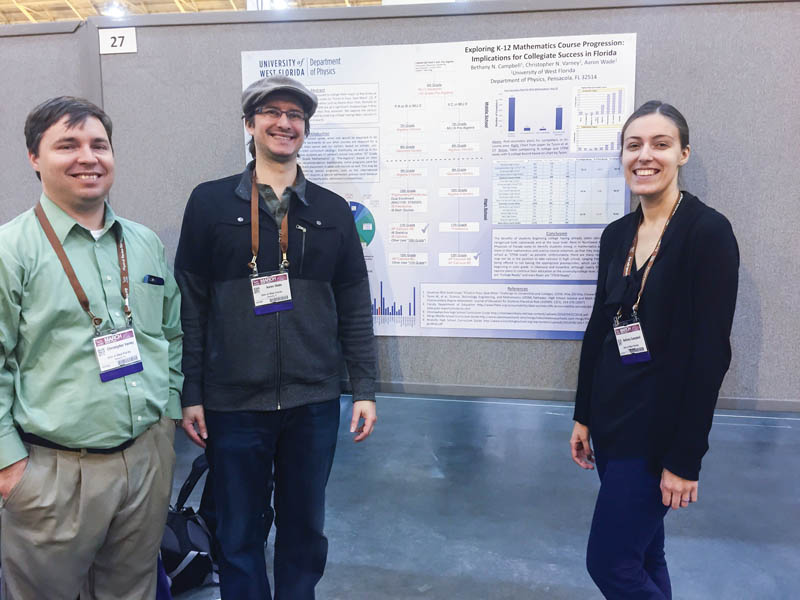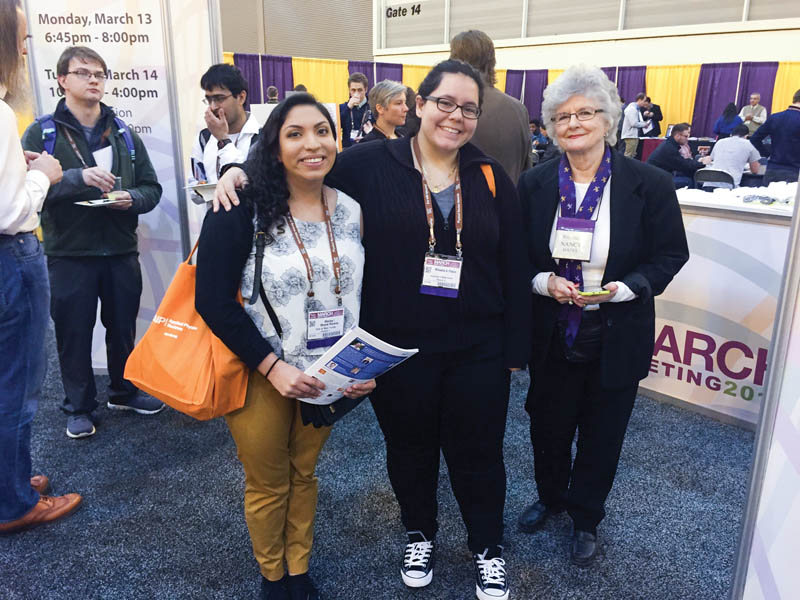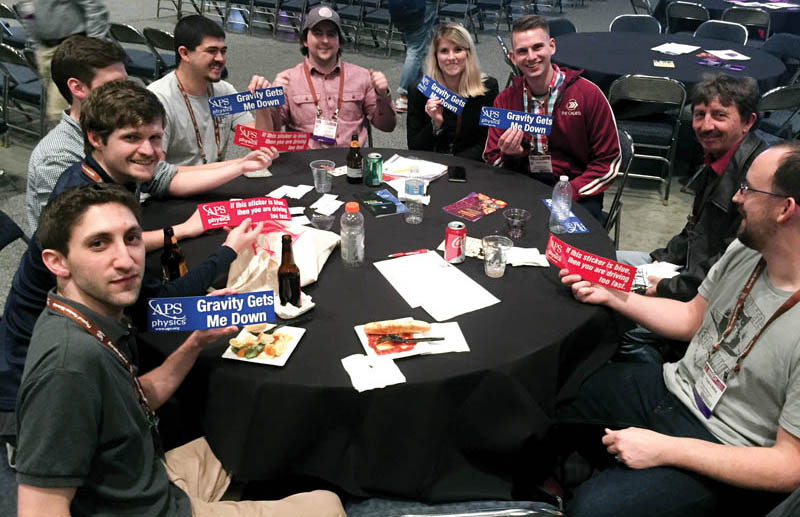American Physical Society March Meeting
March 13, 2017 to March 17, 2017
New Orleans, LA
Meeting host: By:Bethany Campbell
SPS Chapter:

This was my first time attending the March Meeting, and I quite enjoyed it! I have previously attended CUWiP (Conferences for Undergraduate Women in Physics) at Georgia Tech, so I was very excited to finally go to a March Meeting.
I had two favorite parts of the conference: the panel on industry careers and the undergraduate poster session.
Industry Panel
This panel was designed to answer questions about working in industry. We heard from Dr. Erik Lucero at Google, Mr. Raja Rajasekaran from TOPTICA Photonics, Dr. Tiffany Santos from Western Digital, Dr. Pavel Kornilovich from Hewlett Packard Inc., and Dr. Krysta Svore from Microsoft.
The facilitator, Dr. Steven Lambert, also discussed various outreach programs designed to connect students with actual practicing physicists. He told us about APS's mentoring program, IMPact, which connects industry physicists with current graduate students. Apparently, we can also use APS’s membership directory to find physicists near us! Afterwards, the floor was opened up for us to ask questions directly to the panel. It was very interesting to hear about their backgrounds and how they came to be at their current positions.
Among the questions asked:
“When you do research, is your name still on your work, or is it under the company’s name?”
The general consensus was that your name is still attached to the work—you are encouraged to apply for a patent and then your name will be listed as the inventor. It is difficult to publish research in journals, but panelists emphasized that patents are just as valuable as papers, and that it brings them great satisfaction to see their work as a tangible product in use.
“Did you feel pressured to get a PhD just because you don’t have technical expertise for a job?”
Panelists emphasized that employers don’t always expect you to have the exact expertise they are looking for, rather, they desire candidates that have proven they can learn and adapt.
“How valuable are post-docs before industry jobs?”
Panelists agreed that post-docs are still valuable, even if you plan on going straight into industry. Post-docs are also a good entry point into a company. Dr. Svore expressed that she felt as though she may not have been offered a permanent position had she not done a post-doc with Microsoft first. However, she also added the caveat that if one knows exactly what they want to do, perhaps a post-doc is not worth it.
“How should we decide which field to focus on?”
Panelists encouraged us to pursue whatever we are passionate about and can see ourselves spending significant time on. They emphasized that interdisciplinary research is critical and not to be afraid of getting involved in emerging fields! Dr. Steven Lambert (the session's facilitator) added that he had no idea what field he wanted to go into before he actually went into industry.
“What courses should I take, and how do you feel about online certificates?”
Dr. Kornilovich recommended taking advanced statistics coursework. He also said that CAD (computer-aided design) is very useful in his field. Dr. Lucero emphasized that employers want to see that you can build things, so he suggested a bit of engineering or, as Dr. Kornilovich suggested, CAD coursework. Dr. Lambert added that certificates do not make or break an applicant, rather they showcase skills.
“I’m not going to graduate school. What can I expect with just a bachelor’s degree in industry?”
The consensus was that it would not be an easy path to get into industry. Panelists said that the vast majority of their colleagues hold doctorate degrees. However, they also agreed your chances really depend on the specific company. Some companies may encourage movement and development, and may even pay for one to continue their education! While some companies, such as Microsoft, may hire many people with just a bachelor’s degree, others may not.
“To what extent does general experience in theoretical/computational physics aid in finding jobs in industry?”
Theoretical and computational skills, particularly modeling skills, transfer very well to industry. It is also important to be able to write good, efficient code. Panelists also suggested looking at jobs based on the skills they ask for, not necessarily the job title. For example, a computational physicist (perhaps one that knows finite method modeling) position may be listed as an engineering position instead. In addition, they recommended being creative in where you choose to apply —look outside of the traditional fields! Dr. Kornilovich mentioned that there is a lot of physics applied in cosmetics, and that a physicist that studied, say, avalanche powder may be able to find a career studying cosmetic powder.
“You all come from very prestigious universities—what about people from ordinary universities?”
As a student from an “ordinary” university, this question was of particular interest to me. The panel members all had exceptional backgrounds. The only panel member who had a response to this question was Dr. Kornilovich, who said that at Hewlett Packard Inc. in Oregon, they really value local people and that management wants to retain local hires. It was good to hear that major companies will hire local students. I know of companies down here in Northwest Florida that do the same, but it was slightly disheartening that there was not more feedback for us “ordinary university” students.
The remainder of the questions focused on work-life balance, the existence (or lack thereof) of the “forty-hour workweek,” and opportunities for outreach and teaching. The responses were overall positive, with panel members saying that the forty-hour workweek definitely can exist, and that companies actually encourage outreach in the community through affiliate faculty positions at universities, lecture/tutorial series, and mentoring programs.
Another audience member asked about the amount of social interaction in industry, and whether or not it was lacking when compared to academia. The panel members were quick to say that their companies look for people that can work well in teams because of the amount of social interaction and that a collaborative spirit is valued.

Undergraduate Poster Session
I really enjoyed the undergraduate poster session. This was my second time presenting a poster at a conference, and my first time at a national conference! My poster was entitled “Exploring K-12 Mathematics Course Progression: Implications for Collegiate Success in Florida.” At first I felt a little bit out of place with one of the few education posters there. However, I received positive responses. Several of the people I talked to shared their own experiences with how mathematics course progression in grade school affected them. Additionally, I was able to talk to some other students that were pursuing physics education research! It was a lot of fun, and I really enjoyed being able to present my research and talk to other people who are active in the field. I also appreciated the feedback from the judges, who were very kind and offered valuable, constructive comments.
We had several other student presentations, both posters and talks, from my university. One of our students, Kevin Francis, won an Outstanding Presentation Award for his poster, “DFT Investigation for Low-Energy Structures of 22-Atom and 23-Atom Boron Clusters”!

For us, the conference concluded with the Student Awards Banquet. It was a lovely end to the student activities. It started with a physics quiz, in which our team tied for third and won some awesome APS bumper stickers! There were giveaways, and there was plenty of pasta and breadsticks. It was a nice way to decompress and mingle with our fellow students, especially after that long poster session! All in all, the March Meeting was a great time. Our younger undergraduates took advantage of the graduate school fair, and everyone took advantage of the technology and job expo. I’m looking forward to next year—see you in Los Angeles!
